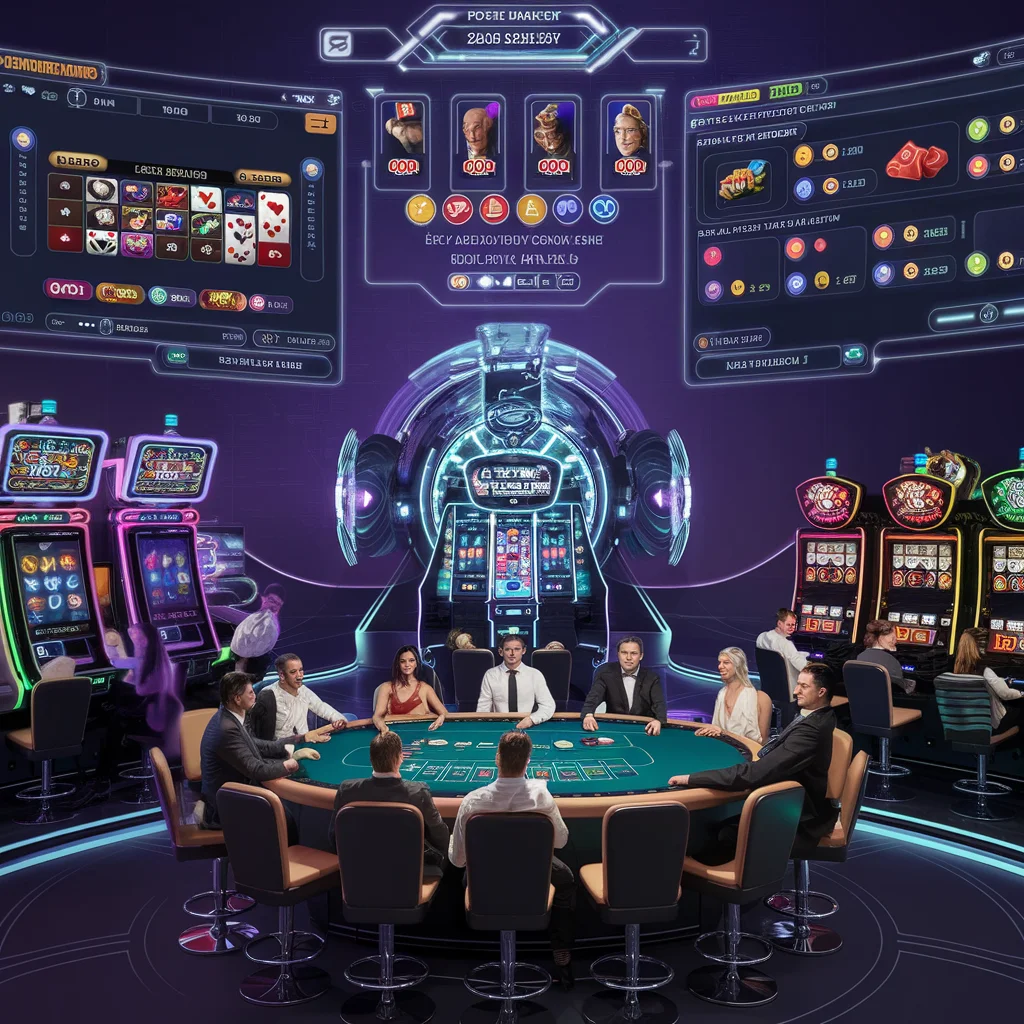The online casino tech industry has experienced remarkable growth over the past two decades. With advancements in technology gambling enthusiasts now enjoy seamless experiences on their smartphones, tablets, and computers. The transformation of this industry is not only about providing entertainment but also ensuring that games are fair, secure, and accessible. This article explores the key technologies shaping the future of online casinos, from the software behind the games to the hardware and user interface that enhance the overall gaming experience.

If you want to know more about Food 4 Less Weekly Ad then checkout our last blog post.
The Rise of Online Casinos
Online casinos became a global phenomenon in the late 1990s when internet access expanded, and businesses realized the potential of reaching players beyond physical casino floors. The initial online gambling platforms were relatively simple, offering limited games and rudimentary interfaces. However, technological advancements over the years have revolutionized the sector, enabling more complex games, better graphics, and enhanced interactivity.
Key Technologies Powering Online Casino Tech
1. Software Development and Game Mechanics
At the core of any online casino is the software that powers the games. In the early days, online casinos mostly used basic software that replicated traditional casino games. Today, however, developers have created sophisticated algorithms that not only improve the gaming experience but also ensure fairness.
- Random Number Generators (RNGs): RNGs are the backbone of online casino games, ensuring that every outcome is truly random and fair. These algorithms generate unpredictable results for games like slots, blackjack, and roulette, mimicking the randomness of outcomes in physical casinos.
- Game Engines: Online casino games are built using powerful game engines. These engines are designed to create a fluid and immersive experience for players, with high quality visuals, sound effects, and user interfaces. Popular game engines, such as unity and unreal engine, enable developers to create 3D games that are visually stunning and realistic.
- Live Dealer Technology: Live casinos have become a significant part of the online gambling landscape. This technology allows players to interact with real life dealers in real time through high definition video streaming. The evolution of cameras, lighting, and streaming software has made live dealer games a more engaging and authentic experience. Players can enjoy games like blackjack, baccarat, and roulette, all while interacting with a live person, providing a sense of being in a real casino.
2. Mobile Gaming
The surge in mobile gaming has been one of the most significant changes in the online casino world. With smartphones becoming an integral part of daily life, online casinos adapted quickly to provide mobile friendly platforms.
- Responsive Design: Modern casinos use responsive design, which allows the games to adjust to various screen sizes without compromising on quality. Whether on a smartphone, tablet, or laptop, players can access their favorite games easily.
- Native Casino Apps: Many online casinos have developed native mobile applications to enhance user experience on smartphones. These apps offer smoother gameplay and faster load times than mobile websites. Players can also access exclusive promotions and notifications, making the gaming experience more personalized.
- Touchscreen Functionality: Mobile casinos utilize the power of touchscreens, enabling players to interact with games using gestures like swiping, tapping, or pinching. This provides an intuitive and enjoyable experience that’s tailored to mobile devices.
3. Virtual Reality (VR) and Augmented Reality (AR) In Online Casino Tech
Virtual reality and augmented reality technologies are slowly but steadily making their way into online casinos, promising to revolutionize the way players experience gambling.
- Virtual Reality (VR): VR technology allows players to enter fully immersive virtual environments. Imagine walking into a casino from the comfort of your home, where you can interact with other players and dealers in real time. VR headsets, such as the Oculus Rift and HTC vive, offer lifelike experiences, making online casinos feel more like real world venues. This technology has the potential to make online gambling more social and interactive.
- Augmented Reality (AR): AR overlays digital elements onto the real world. In the context of online casinos, AR could allow players to enjoy interactive game environments that blend physical and virtual elements. For example, AR could display 3D game elements over a live casino floor, enhancing the realism and engagement of online gaming.
Although these technologies are still in the early stages of integration into the online casino world, their potential is enormous. As VR and AR technologies become more mainstream and accessible, it’s likely that online casinos will continue to invest heavily in these innovations.

If you want to know more about Food 4 Less Weekly Ad then checkout our last blog post.
4. Blockchain and Cryptocurrency In Online Casino Tech
Blockchain technology and cryptocurrencies like Bitcoin have disrupted many industries, and online casinos are no exception. Online gambling platforms are beginning to embrace blockchain for its ability to enhance transparency, security, and efficiency.
- Blockchain: Blockchain ensures secure and transparent transactions, which is particularly important in online gambling, where trust is paramount. By recording every transaction in an immutable ledger, blockchain technology prevents fraud and enhances accountability.
- Cryptocurrency Payments: Many online casinos now accept cryptocurrencies as a form of payment. Cryptocurrencies like Bitcoin, Ethereum, and Litecoin offer players more privacy and faster, cheaper transactions compared to traditional banking methods. These digital currencies are also more secure, as they eliminate the need for third party intermediaries, reducing the risk of hacking or fraud.
- Provably Fair Games: Some casinos use blockchain to offer provably fair games, a system that allows players to verify the fairness of the game results in real time. This transparency fosters trust and makes it more difficult for casinos to manipulate outcomes, ensuring a fair gaming experience for all.
5. Artificial Intelligence (AI) and Machine Learning
AI and machine learning have found their place in the online casino industry by improving player experiences, enhancing security, and optimizing game features.
- Personalized Gaming Experience: AI is used to analyze player behavior and preferences, enabling casinos to offer tailored recommendations and promotions. For example, if a player frequently enjoys playing blackjack, the casino’s AI system may suggest similar games or provide personalized bonuses based on their playing habits.
- Fraud Detection and Security: AI systems are essential for detecting fraudulent activity and preventing cheating. Machine learning algorithms can analyze large volumes of data to spot irregularities in betting patterns and identify suspicious behavior. This is particularly important in live casino environments where ensuring fairness is crucial.
- Chatbots and Customer Support: AI powered chatbots are increasingly used in online casinos to handle customer queries. These bots can instantly respond to questions, assist with account issues, or provide game related support. By handling routine inquiries, AI improves the overall efficiency and effectiveness of customer service.
6. Security and Fairness
Security remains a top priority for online casinos, especially with the rise of digital payments and sensitive player data being exchanged. Casinos invest in advanced encryption technologies, such as SSL (Secure Socket Layer), to protect personal and financial information.
Additionally, ensuring fairness is crucial. Online casinos use third party auditors to test their games for fairness, ensuring that RNGs operate correctly and that outcomes cannot be tampered with. Regulatory bodies in various jurisdictions also oversee online casinos to ensure they comply with strict rules that protect players from exploitation.
The Future of Online Casinos Tech
The online casino industry is far from static, and the future looks bright as technology continues to evolve. Key trends to watch include.
- Integration of more immersive technologies like VR and AR.
- Wider adoption of blockchain and cryptocurrency payments.
- The development of more social and interactive online casino experiences.
- Advances in AI for even more personalized and secure experiences.
As these technologies mature and become more accessible, online casinos will offer increasingly sophisticated, immersive, and fair gaming experiences, attracting an even broader global audience.

If you want to know more about Food 4 Less Weekly Ad then checkout our last blog post.
Conclusion
The online casino tech industry has come a long way from its humble beginnings, largely thanks to technological advancements. From the software that powers games to mobile platforms, VR, blockchain, and AI, technology is at the heart of the industry’s growth. As innovations continue to emerge, the future of online gambling looks set to offer players more exciting, interactive, and secure experiences than ever before. Whether you’re a seasoned gambler or a casual player, the ongoing evolution of online casino technology promises to keep the industry fresh dynamic, and full of new opportunities.



Pingback: Webfreen.com: A New Frontier in Fashion E Commerce